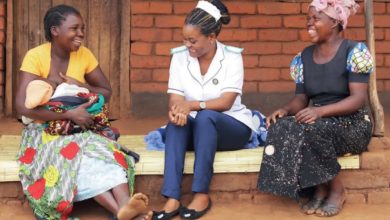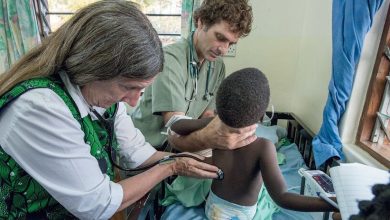Bringing medical relief to MH’s hard-to-reach areas
For communities under Traditional Authorities (T/As) Makanjira and Lulanga in Mangochi District, accessing healthcare services has long been a daunting challenge.
The poor state of the Mangochi–Makanjira Road has left residents suffering in silence, with some losing their loved ones simply because they could not access timely medical treatment.

For 80-year-old Hawa M’balaka from Kantande Village in T/A Lulanga, accessing healthcare service has been a painful walk of blurred vision, aching feet, and silent prayers.
Living more than 140 kilometres from Mangochi Boma—home to the district referral hospital, M’balaka had not seen a medical professional in over two years.
But on a warm Saturday morning recently, the much-needed help arrived, not at a hospital, but right at her doorstep.
“I thought I was going blind,” she said softly, sitting on a Gmelina timber chair inside a classroom-turned-clinic at Kango Primary School in the area.
“But today, I feel like I can see again. These people brought the hospital to us,” she intoned.
Not far from her, at Mpamira Primary School, sat 27-year-old M’bwana Rajab who had just received dental treatment.
A toothache had denied him sleep for several years as he could never afford transport to Mangochi District Hospital.
“I have been in pain day and night, waiting for my fate,” he said.
“When I heard that dentists were coming, I did not hesitate. Now, I have been assisted and I feel like myself again,” added a visibly excited Rajab.
M’balaka and Rajab are just two of over 8 000 people who received free treatment during a two-day mobile medical camp jointly organised by Germany-based Hilal Afrika and its local partner, Dawn Aid Malawi.
The outreach sessions took place at Mpilipili in T/A Makanjira, and Kango and Mpamira in T/A Lulanga—areas considered medically underserved due to their remote location, and lack of road infrastructure.
Getting to the district hospital requires hours of travel by vehicle, something out of question for many villagers.
The initiative, which cost approximately K25 million, ran from last Saturday to Sunday and involved more than 50 health professionals from Mangochi District Health Office.
It provided, free of charge, a full range of services normally available at the district hospital.
Hilal Afrika chairperson Umut Turan said the initiative sought to improve access to healthcare in remote areas, enhancing people’s quality of life and their ability to contribute to community development.
“This is not the first time we have conducted these medical camps,” said Turan.
He added: “We began three years ago after realising the serious healthcare gaps in rural Malawi. Since then, we have treated more than 15 000 people and referred severe cases to district and central hospitals.”
Turan noted that despite being a small organisation, Hilal Afrika remains committed to supporting vulnerable communities in areas such as health, education and food security.
Dawn Aid Malawi chairperson Daudi Omar Mdala echoed Turan’s sentiments, saying his organisation is committed to bringing healthcare services closer to people in hard-to-reach areas.
“We understand the daily struggles these communities face just to access basic health services. That is why we partnered with Hilal Afrika to rescue them,” he said.
Mdala then called on other organisations to join hands in scaling up the initiative.
Senior Chief Lulanga expressed deep gratitude for the continued support, saying the initiative has saved lives and prevented many from suffering avoidable illnesses.
“This project has brought health services closer to the people. It has prevented needless deaths and restored dignity to many lives,” he said.
Mangochi DHO senior medical officer and lead coordinator of the camps, Dr. Innocent Lanjesi, hailed the outreach as a “godsent intervention”.
“Accessing services at Mangochi District Hospital is extremely difficult for many due to poor road network. These camps are a practical response to the government’s vision for universal health coverage,” he said.
Beyond the medicine and the assistance, the camps restored something deeper: dignity and hope.
For elderly villagers like M’balaka the kindness of strangers offering medical help was a reminder that their lives still matter.
As the last patients were being attended to and the sun dipped behind the hills of Mangochi, the medical team began packing their tools.
But for thousands of villagers in Lulanga and Makanjira, the impact of what happened in those two days will be felt for months to come. Not just in healthier bodies, but in hearts that now carry hope.





